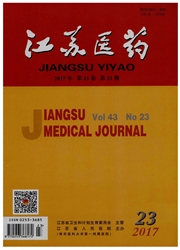

 中文摘要:
中文摘要:
目的探讨糖尿病晚期糖基化终产物(AGEs)对肝癌细胞HepG2增殖的影响及其机制。方法体外培养人肝癌细胞HepG2,以终浓度分别为100、200和400μg/ml的AGEs处理细胞24h,并设正常对照组进行比较。运用细胞计数试剂盒8研究AGEs对HepG2增殖的影响,流式细胞术检测细胞周期的改变,Western blot检测肝癌细胞抗凋亡基因表达。结果 AGEs呈浓度依赖性显著促进HepG2细胞增殖(P〈0.05)。与对照组比较,200μg/ml AGEs干预24h后可以减少HepG2细胞G1期百分率,同时增加S期百分率(P〈0.05)。AGEs可致细胞抗凋亡基因B细胞淋巴瘤-白血病2(Bcl-2)相关蛋白表达增加。结论 AGEs能促进HepG2细胞的增殖,其机制可能与上调Bcl-2相关蛋白表达,加速细胞G1期向S期转换相关。
 英文摘要:
英文摘要:
Objective To investigate the effects of advanced glycation end products(AGEs) on the proliferation of HepG2 cells and underlying mechanism. Methods Human hepatocellular carcinoma HepG2 cells were cultured and exposed to AGEs in the concentrations of 100,200 and 400 μg/ml for 24 hours in vitro.A normal control group was established for comparison.The proliferation of the HepG2 cells was assessed by CCK-8 assay. The cell cycles were analyzed by flow cytometry.Western blot method was used to detect the expression of anti-apoptosis protein. Results AGEs significantly promoted the proliferation of HepG2 cells in a dose-dependent manner(P0.05).Compared with normal control group,the proportion of HepG2 cells was remarkably decreased in the G1 stage and increased in the S stage by AGEs in the concentration of 200 μg/ml(P0.05).The expression of anti-apoptosis gene Bcl-2 protein was increased. Conclusion AGEs can promote the proliferation of human hepatocellular carcinoma HepG2 cells,possibly by upregulating the expression of Bcl-2 protein and accelerating the cell cycle from the G1 to S stage.
 同期刊论文项目
同期刊论文项目
 同项目期刊论文
同项目期刊论文
 Crizotinib as a personalized alternative for targeted anaplastic lymphoma kinase rearrangement in pr
Crizotinib as a personalized alternative for targeted anaplastic lymphoma kinase rearrangement in pr Brentuximab vedotin for treatment of relapsed or refractory malignant lymphoma: results of a systema
Brentuximab vedotin for treatment of relapsed or refractory malignant lymphoma: results of a systema Effects of magnetic nanoparticles of Fe3O4 combinated with gambogic acid on apoptosis of SMMC-7721 c
Effects of magnetic nanoparticles of Fe3O4 combinated with gambogic acid on apoptosis of SMMC-7721 c Targeted multidrug-resistance reversal in tumor based on PEG-PLL-PLGA polymer nano drug delivery sys
Targeted multidrug-resistance reversal in tumor based on PEG-PLL-PLGA polymer nano drug delivery sys Prophylaxis and treatment of acute lymphoblastic leukemia relapse after allogeneic hematopoietic ste
Prophylaxis and treatment of acute lymphoblastic leukemia relapse after allogeneic hematopoietic ste The functional role of microRNA in acute lymphoblastic leukemia: relevance for diagnosis, differenti
The functional role of microRNA in acute lymphoblastic leukemia: relevance for diagnosis, differenti Study on the release of fenofibrate nanosuspension in vitro and its correlation with in situ intesti
Study on the release of fenofibrate nanosuspension in vitro and its correlation with in situ intesti Handy, rapid and multiplex detection of tumor markers basedon encoded silica–hydrogel hybrid beads a
Handy, rapid and multiplex detection of tumor markers basedon encoded silica–hydrogel hybrid beads a Association of polymorphisms of cytosine arabinoside-metabolizing enzyme gene with therapeutic effic
Association of polymorphisms of cytosine arabinoside-metabolizing enzyme gene with therapeutic effic Biocompatibility assessment of polyethylene glycol-poly L-lysine-poly lactic-co-glycolic acid(PEG-PL
Biocompatibility assessment of polyethylene glycol-poly L-lysine-poly lactic-co-glycolic acid(PEG-PL Involvement of c-Jun N-terminal kinase in reversal of multidrug resistance of human leukemia cells i
Involvement of c-Jun N-terminal kinase in reversal of multidrug resistance of human leukemia cells i PLGA-PLL-PEG-Tf-based targeted nanoparticles drug delivery system enhance antitumor efficacy via int
PLGA-PLL-PEG-Tf-based targeted nanoparticles drug delivery system enhance antitumor efficacy via int Biocompatibility Assessment of Polyethylene Glycol-Poly L-Lysine-Poly Lactic-Co-Glycolic Acid Nanopa
Biocompatibility Assessment of Polyethylene Glycol-Poly L-Lysine-Poly Lactic-Co-Glycolic Acid Nanopa Systematic review and meta-analysis of prospective studies for ECP treatment in patients with steroi
Systematic review and meta-analysis of prospective studies for ECP treatment in patients with steroi Hepatocellular carcinoma presenting as thoracic spinal canal metastasis with no clinical primary foc
Hepatocellular carcinoma presenting as thoracic spinal canal metastasis with no clinical primary foc Superselective arterial embolization of the superior mesenteric artery for the treatment of gastroin
Superselective arterial embolization of the superior mesenteric artery for the treatment of gastroin Multifunctional magnetic Fe3O4 nanoparticles combined with chemotherapy and hyperthermia to overcome
Multifunctional magnetic Fe3O4 nanoparticles combined with chemotherapy and hyperthermia to overcome Inducing cell cycle arrest and apoptosis by dimercaptosuccinic acid modified Fe3O4 magnetic nanopart
Inducing cell cycle arrest and apoptosis by dimercaptosuccinic acid modified Fe3O4 magnetic nanopart Gambogic acid suppresses hypoxia-induced hypoxia-inducible factor-1/vascular endothelial growth fact
Gambogic acid suppresses hypoxia-induced hypoxia-inducible factor-1/vascular endothelial growth fact Synergetic effect of functional cadmium-tellurium quantum dots conjugated with gambogic acid for Hep
Synergetic effect of functional cadmium-tellurium quantum dots conjugated with gambogic acid for Hep Reversal of multidrug resistance by cisplatin-loaded magnetic Fe3O4 nanoparticles in A549/DDP lung c
Reversal of multidrug resistance by cisplatin-loaded magnetic Fe3O4 nanoparticles in A549/DDP lung c Effect of magnetic nanoparticles of Fe3O4 and wogonin on the reversal of multidrug resistance in K56
Effect of magnetic nanoparticles of Fe3O4 and wogonin on the reversal of multidrug resistance in K56 期刊信息
期刊信息
